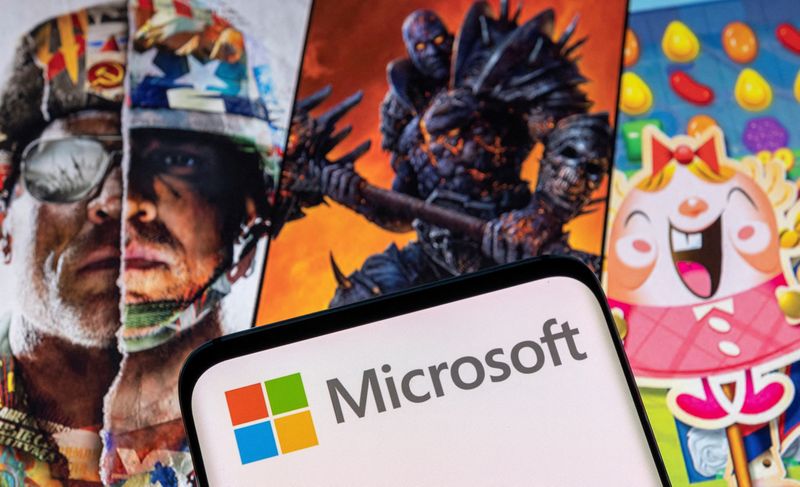US judge temporarily blocks Microsoft acquisition of Activision
2023.06.13 21:01

© Reuters. FILE PHOTO: Microsoft logo is seen on a smartphone placed on displayed Activision Blizzard’s games characters in this illustration taken January 18, 2022. REUTERS/Dado Ruvic/Illustration
By David Shepardson
WASHINGTON (Reuters) – A U.S. judge late on Tuesday granted the Federal Trade Commission’s (FTC) request to temporarily block Microsoft Corp (NASDAQ:)’s acquisition of video game maker Activision Blizzard (NASDAQ:) and set a hearing next week.
U.S. District Judge Edward Davila scheduled a two-day evidentiary hearing on the FTC’s request for a preliminary injunction for June 22-23 in San Francisco. Without a court order, Microsoft could have closed on the $69 billion deal as early as Friday.
Davila said the temporary restraining order “is necessary to maintain the status quo while the complaint is pending (and) preserve this court’s ability to order effective relief in the event it determines a preliminary injunction is warranted and preserve the FTC’s ability to obtain an effective permanent remedy in the event that it prevails in its pending administrative proceeding.”
Microsoft and Activision must submit legal arguments opposing a preliminary injunction by June 16; the FTC must reply on June 20.
Microsoft and Activision did not immediately comment. The FTC declined comment.
Davila said the bar on closing will remain in place until at least five days after the court rules on the preliminary injunction request.
The FTC, which enforces antitrust law, initially asked an administrative judge to block the transaction in early December, arguing it would give Microsoft’s video game console Xbox exclusive access to Activision games, leaving Nintendo consoles and Sony (NYSE:) Group Corp’s PlayStation out in the cold.
Microsoft’s bid to acquire the “Call of Duty” video game maker was approved by the EU in May, but British competition authorities blocked the takeover in April.
Microsoft has said the deal would benefit gamers and gaming companies alike, and has offered to sign a legally binding consent decree with the FTC to provide “Call of Duty” games to rivals including Sony for a decade.
The case reflects the muscular approach to antitrust enforcement taken by the administration of U.S. President Joe Biden.








